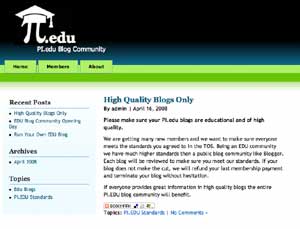 This is kinda fun, the for-profit online college Pickering Institute is using WordPress Multi-User to spread the good word about consolidating student loans, Vegas deals, and domain parking. Now I have championed WordPress Multi-User for a while now because it is what I am comfortable with, and I find it can be pretty effective for creating an online community for teaching and learning. But I wasn’t imaginative enough to think about puttin one of these installations on a .edu domain at charging advertisers $50 a month “to reach an education-minded audience that is difficult to reach with mass-market blogs such as Blogger or Blogspot.”
This is kinda fun, the for-profit online college Pickering Institute is using WordPress Multi-User to spread the good word about consolidating student loans, Vegas deals, and domain parking. Now I have championed WordPress Multi-User for a while now because it is what I am comfortable with, and I find it can be pretty effective for creating an online community for teaching and learning. But I wasn’t imaginative enough to think about puttin one of these installations on a .edu domain at charging advertisers $50 a month “to reach an education-minded audience that is difficult to reach with mass-market blogs such as Blogger or Blogspot.”
Martha pointed me to this Chronicle article that reports on the incident and the subsequent concerns it rasies about the “abuse” of .edu domains. What’s interesting is, according to the Chronicle, “renting blog space on an .edu address may not violate the rules of the educational Internet domain, which is overseen by Educause.” (As a sidenote, I love that Harvard and Stanford blogs are the blogging systems on the Pickering Institute blogroll.)
What seems to be the concern is the threat to the legitimacy of the .edu domain such an instance poses. Yet, the larger question for me seems to be how much value should we invest in a domain in the first place. As Martha suggests, is it fair to assume that the .edu has the same “cachè” that it once did? For this seems to be something that the Chronicle and others are assuming here. For example, UMW has been hosting UMW Blogs on a .org for almost a year now, and well before that several departments had their own .org addresses using Bluehost accounts. I think people got over the fact that it wasn’t a .edu domain pretty quickly.
What’s in a domain? Does the .edu make it somehow more official? It seems absurd that the advertisers who signup for the Pickering Institute blogging service believe it will give them some kind of authority beyond perhaps a quick glance at the site. Maybe an incident like this will open up some questions about what makes one domain more reliable and authentic than another? I see that Canadian schools use the .ca domain, which seems to be far less restrictive than .edu, and it appears they seem to be making out all right. Which begs the largest question, could I host the bava on a .ca address despite my being a red-blooded American? What do you think, bavatuesdays.ca? If so, I could then compete with universities like ubc.ca or ucalgary.ca? Hmmm, there’s a project.


Hmmmm, well I think the rules are getting slacker for some. At least that install is *somewhat* edu related. Dot net and dot org have been fuzzy areas for me. And how many non-companies have a dot com?
As an aside, you need to be a Canadian citizen or have business in Canada to get a .ca domain. 😉 I got one last week. 😀
Andrea,
There go my dreams of bavatuesdays.ca, damn I was planning to move the domain and all. Unless, of course I can borrow your home address for the application 🙂
An interesting question to me, that is also an aside, is what is the logic of a nationalized domain? It actually seems kind strange to define your online presence through the auspices of a specific state? But that’s another post, I guess.
I think the logic for a country-based domain is obvious. when you’re not in the US. 😀
The internet is so US-centric, it serves as a distinction of nationality. Also, the dot com, dot net and dot org were all taken… ;P
Fair enough on this point, I guess I am thinking that it is somewhat interesting to me that the internet reproduces many of the same divisions and codifications of identity along national lines, that it often has promised to erase through the naive claims that the “world is flat,” “digital citizens of the world,” etc. In fact, th idea of a domain being an reflection of some kind of stable or reliable identifier is precisely what this example of “abusing” the edu domain is all about.
Yet, with the emergence of social networks, and the notion of knowing a person through a wide range of different spaces and services, all with different URLs, how much does a domain determine about your appraisal of someone else online given the various ways you can interact with them outside of such a more traditional context of a stable identifier?
The amazingly stupid thing about this whole thing is that the actual domain and all the blogs made are so easy for anyone to find.
Google, Yahoo, and MSN employees can and probably have heard about this I am sure.
Now they are just deciding what to do. My bet is a massive devaluing all of listings.